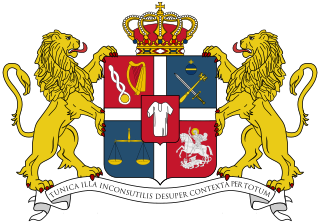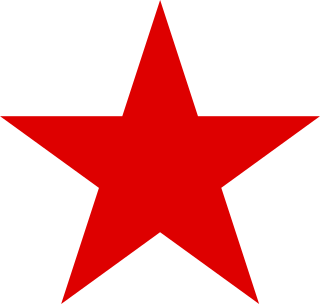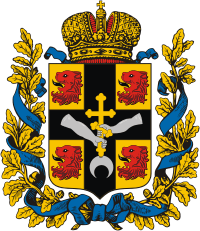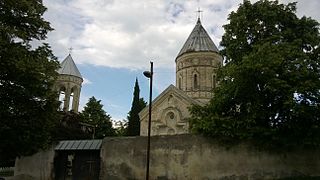 W
WThe state anthem of the Georgian SSR was the regional anthem of the Georgian SSR.
 W
WBorjgali is a Georgian symbol of the Sun and eternity. The borjgali is often represented with seven rotating wings over the tree of life which can be used to create various shapes and variations and can be considered as a main symbol of Georgian culture.
 W
WThe coat of arms of Georgia is one of the national symbols of the republic. It is partially based on the medieval arms of the Georgian royal house and features Saint George, the traditional patron saint of Georgia. In addition to St. George, the original proposal included additional heraldic elements found on the royal seal, such as the seamless robe of Jesus, but this was deemed excessively religious and was not incorporated into the final version.
 W
WThe coat of arms of the Bagrationi dynasty has been used by the former royal family of Georgia and its descendants. It is a symbol of the Bagrationi dynasty, which claims the erstwhile Georgian crown.
 W
W"Dideba" was the national anthem of Georgia from November 1990 to May 2004. It was previously the national anthem of Georgia from 1918 to 1921.
 W
WDzala ertobashia is the official motto of Georgia.
 W
WThe flag of Georgia, also known as the five-cross flag, is one of the national symbols of Georgia. Originally a banner of the medieval Kingdom of Georgia, it was repopularized in the late 20th and early 21st centuries during the Georgian national revival.
 W
WThe following is a list of flags of Georgia.
 W
WThe flag of the Georgian Soviet Socialist Republic was adopted by the Georgian SSR on April 11, 1951.The national flag of the Georgian Soviet Socialist Republic is of red cloth ratio of width to length is 1:2 In the upper corner near the staff box blue, the side of which is half the width of the flag in the middle of the square a circle whose radius is equal to one-third of the square in. range of hammer and sickle, above them a five-pointed star. From the circle to the square sides disagree 24 beam. the hammer and sickle, red star and red rays. From the middle of the right side of the square departs the band of blue across the flag length, width one-third of the square"
 W
WThe grapevine cross, also known as the Georgian cross or Saint Nino's cross, is a major symbol of the Georgian Orthodox Church and dates from the 4th century AD, when Christianity became the official religion in the kingdom of Iberia (Kartli).
 W
WThe hammer and sickle is a symbol meant to represent proletarian solidarity – a union between the peasantry and the working class. It was first adopted during the Russian Revolution, the hammer representing workers and the sickle representing the farmers.
 W
WKartlis Deda is a monument in Georgia's capital Tbilisi.
 W
WA red star, five-pointed and filled, is a symbol that has often historically been associated with communist ideology, particularly in combination with the hammer and sickle, but is also used as a purely socialist symbol in the 21st century. It has been widely used in flags, state emblems, monuments, ornaments, and logos.
 W
WThe emblem of the City of Tbilisi, Georgia, was designed in the late 1980s and reconfirmed as an official seal of the city on June 8, 2005.
 W
WTavisupleba is the national anthem of Georgia. It was adopted as the Georgian national anthem in May 2004, along with a new national flag and coat of arms. The symbols' change was brought about upon the successful overthrow of the previous government in the bloodless Rose Revolution. The music, taken from the Georgian operas Abesalom da Eteri and Daisi, by the Georgian composer Zacharia Paliashvili, was adapted to form it by Ioseb Kechakmadze. The lyrics were composed by David Magradze.
 W
WTetri Giorgi is one of the local names of Christian Saint George in Georgia, specifically in the country’s northeastern highland districts.